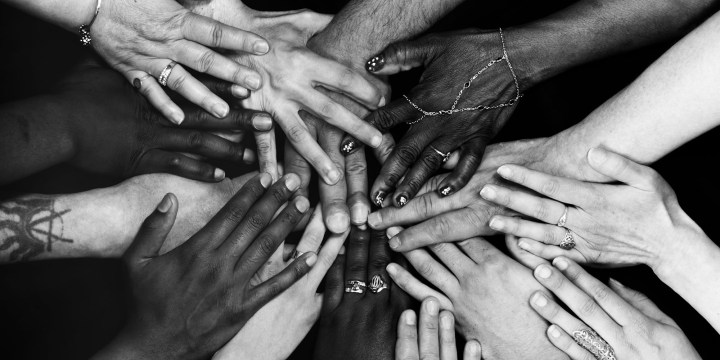BIG IDEAS, BOLD ACTION OP-ED
Ten ideas for the renewal of human rights to meet global challenges

The story we often hear about human rights is one of malaise, as though the best days are behind us. But while the Universal Declaration of Human Rights commemorating 75 years is a moment of sober reflection, it is also a time for renewed hope in a world that needs hope. In that spirit, here are 10 ideas for the renewal of human rights.
Perhaps more than any time in recent history, our world today needs big ideas and bold action.
The interlocking crises and challenges are there for everyone to see. The Covid-19 pandemic laid bare the gross inequities built into the international system. Climate change is threatening the liveability of the planet – while those who have done least to cause it face worsening threats. The relentless march of technology is changing the way we live while concentrating still more power and wealth in the hands of a few.
Meanwhile, the political will to act upon these challenges seems to be in short supply. We hear of a “polycrisis” that is too complex to resolve and hard economic realities that we must swallow, while action on climate is painfully inconsistent and slow.
This is the backdrop against which the Universal Declaration of Human Rights (UDHR) turns 75 this year. The UDHR was part of the great promise of a new world order that would emerge from World War 2, as many countries were also breaking free from the yoke of colonialism. In this new world, human rights would help us to uphold human dignity and pursue equality between nations.
Diverse global rights agenda
Over three quarters of a century, the record of the human rights system which developed from the UDHR has been mixed. There has been huge progress, but the full potential of human rights has often been stymied by politics. Today, we see regressions in many countries, yet at the same time the retreat of US leadership has opened the way for a more diverse global human rights agenda to emerge.
Here are 10 ideas for the renewal of human rights, so they can be fit for purpose in meeting the challenges of today – and perhaps even the next 25 years.
1. Apply the human rights system to the grand global challenges
The most important challenges we face today are global in scope, including climate change and biodiversity loss, rising economic inequality, growing authoritarianism and exponential growth of unprecedented technologies. These are all interconnected and pose deep threats to our future.
As an international framework based on values of dignity and equality, human rights can play an important role in guiding our response to these challenges, and how they manifest in people’s lives. If the human rights agenda of the past has often focussed on human protection in the context of conflict and state violence, increasingly it must also be about creating and safeguarding conditions to uphold human dignity in the face of these great global challenges.
2. Deploy human rights both to set vision and restrain harm
Human rights have different uses.
On the one hand, they are a language of moral urgency which can help us to describe how the world should be. On the other hand, they are an elaborate system of laws, norms, and mechanisms which we can use to restrain harmful behaviour through courts and legislatures.
They are a galvanising force for protest and a framework for litigation and accountability. Quiet diplomacy also has its place. We need to view this flexibility in methodology as a strength, and embrace all the possibilities.
3. Uphold the leadership of those who experience harms
Human rights work should begin with solidarity, so that those who experience harm can lead the agenda. When human rights become a project of the political elites and the powerful, there is a risk of betraying their central purpose as a way for people to have recourse against the abuse of power.
We need to recapture this ideal and reconceptualise human rights work as solidarity. This has many repercussions. Among others, it means that maximising opportunities for people who experience harm to participate meaningfully and safely in the fora where decisions are made should be a human rights priority.
4. Safeguard institutions
In an age of populism, institutions of all kinds are under strain, readily attacked by politicians and limited in their ability to defend themselves. Human rights institutions are among the favourite targets: former US president Donald Trump’s withdrawal of the US from the UN Human Rights Council and the UK’s threats to pull out of the European Convention on Human Rights are two examples.
We have a right to expect much from our institutions. But when we critique them or demand improvements, as we must, we should do so from a position of good faith – which includes actively defending their core purpose and pushing for the funding they need to do their job properly.
5. Develop interdisciplinary approaches to pursue bold ambitions
The current global context is ripe for bold, ambitious ideas suited to the scale of challenges that we are facing. But we are also seeing the interconnections between things more clearly than ever before. We simply cannot afford to think of human rights, development, climate change and peace as separate domains – if we ever could.
This is the time when we need to learn to speak each other’s languages, across these artificially defined sectors and beyond. In particular, human rights actors need to speak the language of economists, and vice versa.
6. Refocus the human rights agenda on tackling inequalities
Since the earliest days of the multilateral human rights system, many Global South countries have seen it as a way of pursuing economic development and addressing the inequalities that exist between states.
This has long been an uphill struggle.
Yet, the status inequality asserted by human rights needs to be backed up with action to address economic and other inequalities between people. The human rights system includes important tools for doing so. Today, wealthy states in the Global North who are concerned about China’s appeal to Global South countries should see that to support this aspiration is not only the right thing, but also the smart thing to do.
7. Meet the challenges of climate change with a rights-based approach
Climate change is arguably the most pressing challenge in the world, together with the closely related biodiversity crisis. It is by now well-established that it is also a human rights crisis.
There has already been significant recourse to human rights law in climate litigation, which is likely to continue. Many aspects of loss and damage, which is likely to become a growing preoccupation in years ahead, can also be described in human rights terms. And in future, climate change will affect the entire arena in which all our claims on human rights play out. The human rights chain reactions of the crisis are impossible to predict, although we can easily envisage massive displacement and the populist hostility that could be stoked in response. We need to prepare for this.
8. Contemplate the boundaries of human rights with an open mind
In time, we may find that the biggest problem with human rights is the “human” part of the equation. This is coming under pressure from two sides.
One is that we are becoming more aware of our destructiveness of, and our dependency on, our natural environment. The growing rights of the nature movement is starting to reckon with this. The other is our relationship with technology, which is gradually reshaping our experience of being human and our social contract.
In future, we might find that we need to situate human rights within a more integrated vision of human flourishing in relation to our natural and technological environment.
9. Protect the human mind
Advances in neurotechnology are creating unprecedented capabilities for reading the human brain. Increasingly, the next frontier for technology is inside the human mind. Notwithstanding the advantages this could bring, including in healthcare, it also brings the potential for those in control of the technology to exploit and manipulate us. The extent to which we are in control of our own internal lives is ever more in question.
The human rights framework can provide important ways of confronting this encroachment on human autonomy. Scholar Nita Farahany has, for example, proposed elaborating a right to “cognitive liberty” to set limits on how far technology can reach into our minds.
10. Choose the metaphors with care
Human rights are by nature an emotive subject. They are about experiences of pain and violence. But they are also about hope, and about creating the conditions for human flourishing. As such, we should be thoughtful in how we talk about them.
Often, we use the language of conflict: we struggle, protect, defend, fight for rights. When things become difficult, we turn to metaphors in the same oeuvre. We are losing, retreating, facing defeat. There is a place for this language but perhaps we need to widen our range of metaphors. The process of pursuing human rights change is often long and slow. If we think of human rights as something to grow and nurture, then the question we face is how to make the ground more fertile. DM
David Griffiths is a human rights strategist and an associate fellow at Chatham House in London. This article is adapted from a piece he wrote for the Chatham House London Conference in June 2023.





















If you want to solve the world’s problems, you have to address the concentration of virtually unaccountable power in the hands of multi-national corporate super-managers and many politicians. Human rights arise out of human beings of free will choosing to demand them. Sham democracies and exclusive multi-national corporations functioning in all corners of the world make it a difficult ask to get billions of human beings to challenge power that is protected by well equipped public order policing. The 20th Century was the century of human rights. The 21st needs to become the Century of Accountability
Agreed